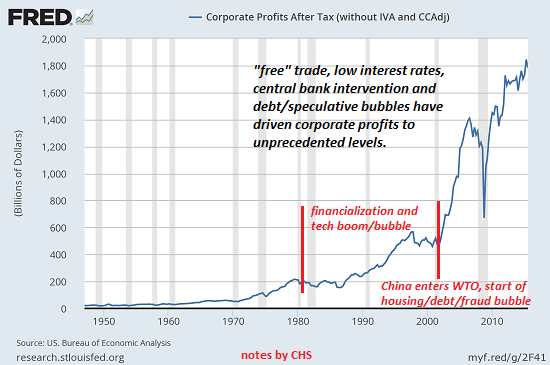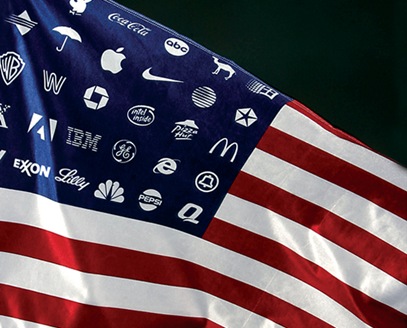Submitted by Charles Hugh-Smith via OfTwoMinds blog,
Ultimately, the dominance of global capital (the Corporatocracy) is not financial – it's political.
One little-remarked consequence of the central banks' policies of near-zero interest rates and quantitative easing is the unrivaled dominance of mobile global capital, i.e. the Corporatocracy. The source of corporate political power is the ability to borrow essentially unlimited sums for next to nothing: what I have long termed free money for financiers.
Armed with central-bank supplied unlimited credit, global capital can outbid local residents and businesses. Over time, profitable enterprises and assets end up in corporate hands.
Consider the typical family farm, not just in America but in Germany, Australia, etc. It's hard work squeezing a livelihood from the land in a market dominated by a handful of global corporate giants and their state handmaidens, and so unsurprisingly many in the next generation have opted for corporate-state jobs in urban areas rather than shoulder the financial risks of continuing the family farm.
A neighboring farmer might be interested in buying, be he/she will have to borrow the money at (say) 4%.
The global corporation can sell bonds (i.e. borrow money) at less than 1%. The lower cost of capital enables the corporation to outbid local farmers for the land, and this low cost of borrowing also enables the corporation to fund capital-intensive economies of scale that are beyond the reach of family farms.
The net result is the nation's farmland, its core productive asset, slides inevitably into corporate ownership. Anyone who resists selling out is crushed by low prices (corporate farms can over-produce and survive low prices, family farms cannot), or they are crushed by the disadvantages of being an "outsider" selling to the corporate supply chain, which favors in-house suppliers or large corporate producers.
The same dynamic–the unparalleled power of cheap credit–leads to corporate ownership which then funds corporate dominance of the political process. Consider building a house for your family. You'll need construction financing, and since that's riskier than a conventional mortgage to buy an existing home, that will cost you between 4% and 5%, and requires thousands of dollars in fees.
The corporate homebuilder can borrow at 1%. Guess who's construction costs are cheaper?
As corporations buy up productive assets, they consolidate these assets into cartels and quasi-monopolies that can be protected from competition by lobbying and campaign contributions. Once you can buy up productive assets with cheap borrowed money, the profits start piling up, and you can use a thin sliver of these profits to hire lobbyists and buy political favors/protection from politicos desperate to cling onto their power.

The net result of unlimited credit for corporations is a Corporatocracy that constantly expands its financial and political power. And the net result of this corporate control of governance is: governments come and go, candidates come and go, and political movements come and go, but the Corporatocracy remains in charge.

If interest rates were 10% for everyone and every entity, individuals and small enterprises that had saved up cash could outbid corporations, which habitually get crushed in downturns by high interest payments. At zero interest rates, corporations can outbid savers, households and small businesses, who don't get to borrow billions of dollars at near-zero rates from central banks.
Loan me $10 billion at 0.25% annual interest and I'll assemble some profitable assets, too. Any of us can get obscenely wealthy if we have an unlimited credit line at .25% annual interest (i.e. essentially free money).
Ultimately, the dominance of global capital (the Corporatocracy) is not financial– it's political. The populace and their elected leadership either allow corporations to dominate (via central bank policies) or they strip the central banks of the power to create a dominant Corporatocracy.
The choice is ours–or it used to be. No wonder voting fraud is the tool-du-jour of the Corporatocracy's political toadies in the U.S.. It's far too dangerous to actually let the Great Unwashed taxpayers make political decisions; they might oust the central bankers, and if they did that, the corporatocracy and their political toadies would suffer an inevitable decline as their free-money spigots were turned off.
The post Governments Change; The Corporatocracy Endures appeared first on crude-oil.top.
